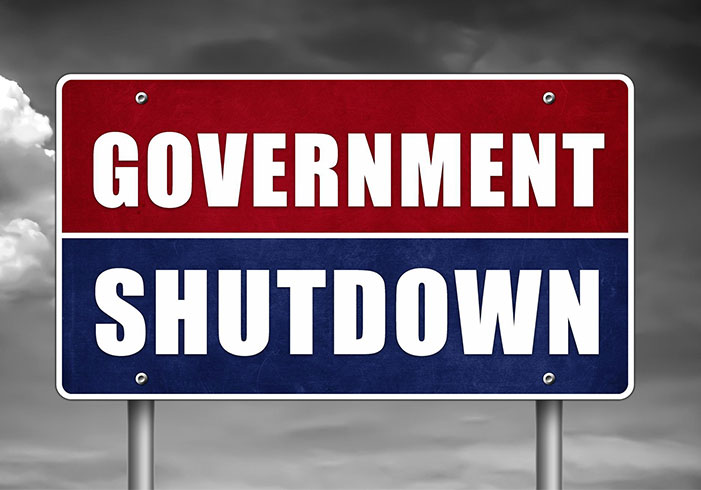Shippers and freight handlers are starting to raise concerns about the delays that are soon to affect supply chains if the current partial government shutdown continues. As it stands, problems are already occurring from certain U.S. agencies cutting back their available services and reducing working hours.
The beginning of a shutdown is stressful and overwhelming, but agencies are still functioning as they scramble to figure out what steps come next. As the shutdown continues, more and more agencies are closing their office doors and cutting their staff hours back. This makes it difficult for departments to work with one another. Shippers who have problems with their goods and need to contact two or more agencies responsible for separate parts of the shipping process are facing larger delays than usual.
Effects of the Government Shutdown on Shipments
Exporters are facing delays with license approval. Fewer security staff are available to scan shipments for air cargo. Customs refund processing times are increasing as officials focus their time on moving goods through airports as fast as possible. There are similar unresolved issues that as a result are taking longer, and this is only getting worse.
Essential Government Departments Needed for Shipments Create Problematic Delays
CBP agents are on furlough. Customs and Border Protection are responsible for the processing of all goods that pass through the borders and customs stations. While these locations remain open, fewer agents are on hand and these agents remain without pay. This is leading to mass disgruntled behavior and in some situations borderline strikes.
Imports, in some cases, require Federal approval from the Environmental Protection Agency. The EPA is no longer staffing its offices at the moment, thus unable to process approvals. As a result, issues are piling up without resolution.
The Transportation Security Administration is experiencing staffing gaps. There have been hold-ups at cross-border shipping regions, exacerbated by delays at airports handling passenger operations. All of these issues are a result of staffing gaps at TSA checkpoints. For many shippers, the challenge has been working out issues with an email or a phone call. If by some chance the shipper is able to find someone willing to help, they’re likely already drowning under a series of similar requests. In some cases, shipping becomes outsourced to a private company. While this does expedite the process, if problems occur, TSA remains the party responsible for handling these issues.
Similarly, TSA is facing a series of strikes from its employees who are demanding pay. With these employees already working fewer hours than normal and not receiving pay, the time that is now spent on strike takes away from the amount of time put into processing packages for travel.
These are not the only departments that are impacting parts of the supply chain operations for shippers and freight companies. Many companies rely upon the Commerce Department and its monthly trade data in order to properly engage in manufacturing activity outside of the United States. Without that information, shippers can’t maintain knowledge of trade flows, nor can they make macro-level decisions.
Factors that Contribute to Delay Times
One of the biggest factors that contribute to delay times are the import hubs and freight networks still experiencing strain as a result of shipments processed near the end of 2018 by businesses trying to get ahead of tariff restrictions pending in 2019. There were already serious delays at the port and the shutdown has only created larger issues.
Other factors have contributed to delay times in shipments this month as a result of the government shutdown.
As more and more departments remain understaffed or furloughed, tangential shipping issues are without resolution. The staff normally responsible for handling questions, resolving backlogged problems, and issuing refunds, simply aren’t available to handle administrative work. Instead, they are trying to stay afloat by performing the crucial duties of the department such as scanning passengers and cargo for flights or checking items at the border.
Efforts to Avoid Significant Delays
Certain screening procedures help air-cargo shipping companies sidestep delays at airports. These shippers have done this by turning to certified private companies to screen their cargo before it gets to the airport. Doing this means that TSA is not responsible for screening at the airport while they are currently understaffed and going without pay. Over half the cargo currently flying out on passenger planes this last month arrived at the airport pre-screened which helps to avoid significant delays.
There exists an emphasis on the need to be patient. When staff isn’t available within a department to resolve an issue, don’t rely on leaving a message. When departments are only staffed half of the time, they become saturated with issues to resolve. They are more likely to handle issues when they receive phone calls while they are in office. Shipping companies must have the staff and perseverance needed to make contact and resolve issues at hand.
Shippers are worrying that they will face increasing delays as a result of these issues and these delays certainly seem to be compounding. It seems that delays will only continue, problems will fill desks, and phones will remain unanswered. As the shutdown continues, shippers, alongside many other industry members, will face continued delays and subsequent operational hindrances. Thankfully, there are solutions to overcome the most severe of delays. But, long-term the best solution for everyone is an end to the government shutdown altogether.





